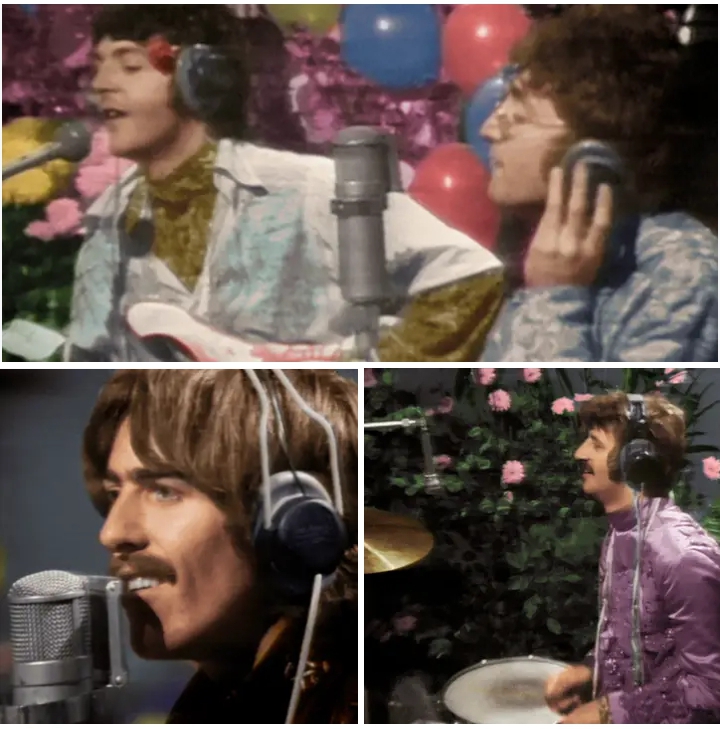Fifty-eight years ago today, a moment of television history — and cultural significance — was made. On June 28, 1967, amid the chaos of the Vietnam War, the first live international satellite television broadcast titled Our World was beamed across the globe. The groundbreaking production united 14 countries in a live, multinational broadcast, sharing a message of…
Fifty-eight years ago today, a moment of television history — and cultural significance — was made. On June 25, 1967, amid the chaos of the Vietnam War, the first live international satellite television broadcast titled Our World was beamed across the globe. The groundbreaking production united 14 countries in a live, multinational broadcast, sharing a message of unity and peace during one of the most turbulent times in modern history.
Among the most powerful and iconic moments of the program was the United Kingdom’s contribution, delivered by none other than The Beatles, who took center stage to debut a brand-new song that would become an anthem for generations: “All You Need Is Love.”
A World First
Our World was a revolutionary television event, the first time in history that countries across continents were connected live via satellite. Coordinated by the BBC and broadcast through the Intelsat satellite system, it reached an estimated 400 to 700 million people across 24 time zones — an unprecedented feat in 1967.
The program featured artistic and cultural segments from nations including the United States, Canada, Japan, France, Italy, West Germany, and Australia. Each country was tasked with showcasing something unique about their culture, and in the midst of this technological and artistic display, The Beatles were asked to represent the UK.
At the time, the world was caught in the grip of the Cold War, the civil rights movement, and especially the Vietnam War, which had intensified globally. The decision to present a musical message of peace was both intentional and profound.
The Beatles Take the World Stage
Broadcast live from EMI Studios at Abbey Road in London, The Beatles — John Lennon, Paul McCartney, George Harrison, and Ringo Starr — took part in the broadcast alongside a live orchestra and a studio filled with invited guests and fellow musicians. Among them were Mick Jagger, Keith Richards, Eric Clapton, Marianne Faithfull, and Graham Nash.
At the request of the BBC, John Lennon composed a song that would be simple and universal in message, something that could resonate across languages and cultures. That song was “All You Need Is Love.”
Opening with the strains of “La Marseillaise” and peppered with musical references to Bach, Glenn Miller, and even The Beatles’ own past hits, the performance was unlike anything seen on television before — a vibrant, experimental, and deeply emotional moment that captured the spirit of 1967’s “Summer of Love.”
“It was John’s idea, really,” McCartney would later recall. “We knew it had to be simple, so everyone could understand. And he just nailed it.”
A Message of Peace Amid Conflict
What made the moment so powerful wasn’t just the song or the scale of the broadcast — it was the timing. In a year dominated by war headlines, protests, and generational division, Lennon’s repeated chorus — “All you need is love” — offered a stark contrast to the violence dominating the news.
Even as U.S. troops poured into Vietnam and tensions rose across the globe, millions of people sat in their homes and watched four musicians from Liverpool deliver a message that defied politics, geography, and language barriers.
“It was hope. It was love. It was exactly what the world needed,” one viewer in Paris later told the press.
Cultural Aftershock
“All You Need Is Love” was officially released as a single just days later, on July 7, 1967, and quickly topped charts around the world. More importantly, it cemented itself in the cultural lexicon as one of the defining songs of the era.
The Our World broadcast not only demonstrated the power of technology to connect the globe — it also showcased music’s unparalleled ability to speak to the human soul, regardless of time or place.
Since then, the performance has been studied in classrooms, replayed in retrospectives, and cited in documentaries. It was recreated in 2012 as part of the London Olympics opening ceremony, and Lennon’s lyrics have since been quoted by everyone from activists to presidents.
Looking Back, Moving Forward
As we remember Our World on this day in 2025, it’s more than just a broadcast anniversary. It’s a reminder of what’s possible when art, technology, and human compassion converge.
Nearly six decades later, in an era of new tensions and global challenges, the message remains as clear and necessary as ever:
Love is universal. And all you need is love.
